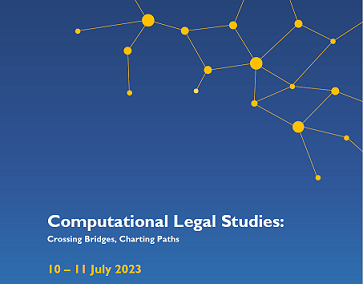The Centre for Computational Law has merged with the Centre for AI and Data Governance to form the Centre for Digital Law. The new Centre examines the transformative impact of digital technologies on legal systems, government, society, and economy. Our research, including the Research Programme on Computational Law, continue under its ambit. Our current website will remain operational in this transitional period but we strongly encourage you to visit our new website at cdl.smu.edu.sg and explore the updated features and content. If you have any questions or need assistance, please contact our support team at cclawadmin@smu.edu.sg.
Computational Legal Studies (CLS) 2023

Computational legal scholars have been experimenting with machine learning and natural language processing techniques for years, but 2023 may well come to be remembered as the year these techniques were skyrocketed into mainstream legal conversations on the back of technological as well as business advances with large language models. With ‘just use ChatGPT’ seemingly becoming the go-to ‘solution’ for everything, where does computational legal studies stand today, especially in relation to ‘non-computational’ analyses of law (however defined), and other computational legal methods not based on machine learning?
It is perhaps timely that this year’s Computational Legal Studies is held a pre-cursor workshop to the Computational Law Conference (CLAWCON). CLAWCON is a practice-oriented conference focusing on Love & Genesereth-style computational law and its industry applications. This allows us to examine how CLS as we understand it stands in relation to industry practice and to the adjacent field of computational law. The workshop theme, “Crossing Bridges, Charting Paths” specifically invites attendees to reflect on where machine learning and network analysis may be most meaningfully applied, alongside other computational techniques, to further both the theory and practice of law.
Guided by the theme, abstracts were solicited on all aspects of computational legal studies. The final workshop programme reflects a strong diversity of perspectives from scholars across sub-disciplines, geographies, and career stages. Regardless of where (and when) you are joining us from, we hope you find these proceedings informative towards your own work and research.
Please direct any inquiries to CCLAW Dy Director Asst Prof Jerrold Soh or CCLAW Centre Manager Lis Kho.